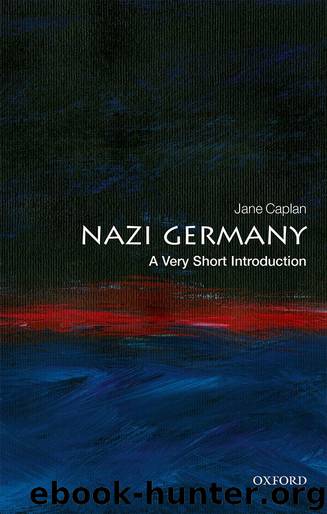Nazi Germany by Jane Caplan

Author:Jane Caplan
Language: eng
Format: epub
ISBN: 9780191016905
Publisher: OUP Oxford
Published: 2019-06-21T16:00:00+00:00
Limits of opposition
The regime itself was well aware of such problems, but for others to draw attention to them was fraught with risk, while organized opposition or resistance that intended to damage the regime was crushed wherever it emerged. Even though most Germans did not experience this directly, Nazi Germany remained a police state backed by terror and violence. With the silencing of pluralist voices and the dissolution of familiar underpinnings of independent social life, even reluctant Germans could learn to collude in their own de facto integration. Most political activists eventually resigned themselves to waiting for liberation by defeat in the war they knew was coming; they concentrated on preserving skeletons of their organizational networks for a post-Nazi future. Where collective life was not corroded by fear, it was liable to be compromised by distrust. Familiar milieux—the workplace, the pub, even the family—became unreliable. The tangle of trade unions, voluntary associations, and local clubs hitherto braided into German social life was now destroyed or ‘coordinated’, or else dwindled and died.
The only surviving institutions that offered some semblance of an alternative ideology and identity were the Protestant and Catholic churches; but their independence was compromised, especially in the case of Protestants, by their enthusiasm for Nazism as a shield against godless Marxism and materialism. Given that 95 per cent of Germans were formally members of one or other of the two denominations, regime propaganda was equally keen to exploit the authority of Christian values, even if this did not entirely silence more anti-Christian and anticlerical ideologues in the SS. Dealing with open religious resistance was another matter. Jehovah’s Witnesses suffered unremitting persecution for their dogmatic refusal to bow to the state in any way. The establishment of an antisemitic ‘German Christian’ church that repudiated the Old Testament led to the secession of orthodox Protestant ‘confessing Christians’, some of whom, like individual Catholic priests, were willing to confront the regime and face the consequences. Otherwise, the church hierarchies largely focused on protecting their own institutional existence; Jews could look for succour only if they were baptized or in mixed marriages. In the rest of society, resistance was confined to small numbers of courageous individuals and precarious groups and networks motivated by political or ethical convictions. Their actions, repeatedly overwhelmed by Gestapo repression, included workplace sabotage, disseminating illegal literature, protecting individuals at risk, and maintaining contact with the wartime Allies. Other Germans simply endeavoured to preserve the habit of independent thought through what came to be called ‘inner emigration’: a withdrawal into private worlds of belief and morality.
Download
This site does not store any files on its server. We only index and link to content provided by other sites. Please contact the content providers to delete copyright contents if any and email us, we'll remove relevant links or contents immediately.
| Africa | Americas |
| Arctic & Antarctica | Asia |
| Australia & Oceania | Europe |
| Middle East | Russia |
| United States | World |
| Ancient Civilizations | Military |
| Historical Study & Educational Resources |
The Ratline by Philippe Sands(1568)
The Holocaust: A New History by Laurence Rees(1520)
The Diary of a Young Girl: The Definitive Edition by Anne Frank; Otto Frank; Mirjam Pressler(1316)
Anne Frank: The Diary of a Young Girl by Anne Frank(1265)
The diary of a young girl: the definitive edition by Anne Frank; Otto Frank; Mirjam Pressler(1229)
Eichmann in Jerusalem by Hannah Arendt(1164)
The Diary of a Young Girl by Frank Ann(1132)
Yes to Life by Viktor E. Frankl(1058)
The New York Times Complete World War II: The Coverage of the Entire Conflict by The New York Times(1003)
Schindler's List by Keneally Thomas(965)
Frank, Anne - The Diary of Anne Frank by Frank Anne(912)
Clara's War by Clara Kramer(910)
Mengele by David G. Marwell(846)
And the Sea Is Never Full by Elie Wiesel(826)
The Pink Triangle: The Nazi War Against Homosexuals by Plant Richard(815)
My Grandfather Would Have Shot Me by Jennifer Teege(812)
The Master Plan by Heather Pringle(805)
All Rivers Run to the Sea: Memoirs by Elie Wiesel(780)
Return to the Reich by Eric Lichtblau(769)
